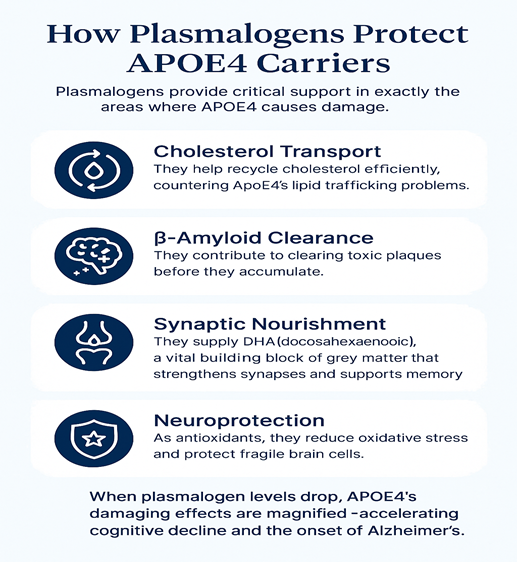APOE4 Carriers at Risk: Can Plasmalogens Protect Against Alzheimer’s?
Plasmalogen Levels and the APOE4 Gene: Connecting the Dots in Alzheimer’s Risk
When it comes to Alzheimer’s disease, one genetic factor stands out more than any other: the APOE ε4 allele (commonly called APOE4). Carrying one—or especially two—copies of this gene variant significantly increases the risk of cognitive decline and late-onset Alzheimer’s disease.
But why? The answer isn’t one single problem. Instead, it’s a cascade of challenges in the brain, many of which tie directly to plasmalogens—a special type of lipid that protects cells, supports brain function, and regulates inflammation.
APOE4 and Lipid Imbalance
In a healthy brain, cholesterol and lipids are carefully managed. This balance supports:
- Strong cell membranes
- Synaptic plasticity (the ability of neurons to adapt and form new connections)
- Neuronal repair
- Clearance of harmful proteins like β-amyloid
APOE3, the more common version of the gene, does this job efficiently. APOE4, however, mismanages cholesterol recycling. This leads to:
- Impaired cholesterol transport
- Oxidative stress in neurons
- Weakened brain repair systems
- Increased β-amyloid buildup (a hallmark of Alzheimer’s disease)
-
The result? A brain that’s more vulnerable to neurodegeneration.

The Link Between APOE4 and Plasmalogen Levels
Recent research adds another layer to this story: lower plasmalogen levels in APOE4 carriers.
Dr. Dayan Goodenowe’s study, Relation of Serum Plasmalogens and APOE Genotype to Cognition and Dementia in Older Persons, found that:
- People with lower plasmalogen levels were more likely to show cognitive decline and dementia.
- APOE4 carriers, in particular, had reduced plasmalogen levels.
This suggests that APOE4 may not just affect cholesterol—it may also disrupt plasmalogen metabolism, creating a double-hit to brain resilience.
Why This Matters
For APOE4 carriers, supporting plasmalogen levels may be one of the most important ways to protect long-term brain health. Plasmalogens appear to:
- Defend against APOE4-related vulnerabilities
- Support memory and cognition
- Reduce harmful inflammation and oxidative stress
- Promote resilience against Alzheimer’s disease
This connection makes plasmalogens both a potential biomarker (to help detect risk early) and a promising therapeutic target for prevention.
Protecting Brain Health with Confidia
At Confidia Health Institute, led by Dr. Kevin Greene, we take a precision approach to protecting the brain, especially for individuals at higher genetic risk like APOE4 carriers.
By incorporating advanced tools such as plasmalogen restoration therapies (including ProdromeNeuro™ and ProdromeGlia™), our team helps:
- Support cholesterol balance and lipid metabolism
- Strengthen synapses and memory function
- Reduce oxidative stress and chronic inflammation
- Protect long-term cognitive resilience
👉 If you know you carry the APOE4 gene—or if you want to protect your brain health as you age — contact Confidia Health Institute today. Dr. Kevin Greene and our team can help you take a proactive, science-driven approach to preserving cognition, slowing decline, and building a foundation for lifelong brain health.
